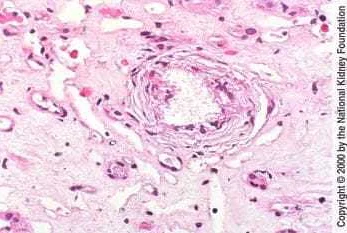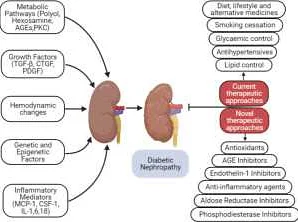Metabolic Nephropathies
Содержимое
Discover the causes, symptoms, and treatments of metabolic nephropathies, a group of kidney diseases characterized by abnormalities in metabolism. Learn how to manage and prevent these conditions to maintain kidney health.
Metabolic nephropathies refer to a group of kidney disorders that result from abnormalities in the body’s metabolic processes. These disorders can have a significant impact on the overall health and function of the kidneys, leading to various symptoms and complications. Understanding the causes, symptoms, and treatment options for metabolic nephropathies is crucial for accurate diagnosis and effective management of these conditions.
One of the primary causes of metabolic nephropathies is an underlying metabolic disorder, such as diabetes or a genetic condition affecting metabolic pathways. These disorders can disrupt the normal chemical balance in the body, leading to the accumulation of certain substances in the kidneys. Over time, this accumulation can damage the kidney tissue and impair its ability to filter waste products and excess fluids from the blood.
The symptoms of metabolic nephropathies can vary depending on the specific condition and the extent of kidney damage. Common symptoms may include frequent urination, foamy or dark urine, swelling in the extremities, fatigue, and high blood pressure. In more severe cases, individuals may experience kidney failure, which can manifest as reduced urine output, nausea, vomiting, and anemia.
Treatment options for metabolic nephropathies aim to slow down the progression of kidney damage, manage symptoms, and prevent complications. This typically involves a combination of lifestyle modifications, medication, and, in some cases, dialysis or kidney transplantation. Lifestyle changes may include adopting a healthy diet low in salt and protein, maintaining a healthy weight, and exercising regularly. Medications may be prescribed to control blood pressure, manage blood sugar levels, or reduce inflammation in the kidneys.
In conclusion, metabolic nephropathies are kidney disorders that result from abnormalities in the body’s metabolic processes. These conditions can lead to various symptoms and complications, including kidney failure. Early diagnosis and appropriate treatment are crucial for managing these conditions and preserving kidney function. With proper medical care and lifestyle modifications, individuals with metabolic nephropathies can lead a healthy and fulfilling life.
What are Metabolic Nephropathies?

Metabolic nephropathies refer to a group of kidney disorders that are caused by abnormalities in the body’s metabolism. These conditions can affect the kidneys’ ability to function properly, leading to a variety of symptoms and complications.
Metabolism is the process by which our bodies convert food into energy and eliminate waste products. When this process is disrupted, it can have a negative impact on the kidneys, which play a crucial role in regulating the body’s fluid balance, filtering waste products from the blood, and producing urine.
There are several different types of metabolic nephropathies, each with its own underlying cause and set of symptoms. Some common examples include:
- Diabetic nephropathy: This condition occurs in people with diabetes and is characterized by damage to the kidney’s blood vessels.
- Cystinosis: Cystinosis is a genetic disorder that leads to the buildup of the amino acid cystine in the kidneys and other organs.
- Alport syndrome: Alport syndrome is a genetic condition that affects the collagen in the kidneys, leading to progressive kidney damage.
- Oxalosis: Oxalosis is a condition in which calcium oxalate crystals accumulate in the kidneys, causing kidney stones and damage to the renal tubules.
The symptoms of metabolic nephropathies can vary depending on the specific condition and the severity of the kidney damage. Some common symptoms include:
- Proteinuria: Excess protein in the urine.
- Hematuria: Blood in the urine.
- Edema: Swelling in the legs, ankles, or face.
- High blood pressure: Elevated blood pressure levels.
- Decreased urine output: Reduced amount of urine produced.
- Fatigue: Feeling tired or weak.
Treatment options for metabolic nephropathies depend on the specific condition and the extent of kidney damage. In some cases, lifestyle changes such as maintaining a healthy diet, managing diabetes or high blood pressure, and avoiding certain medications can help slow the progression of kidney damage. In more severe cases, medication, dialysis, or kidney transplantation may be necessary.
In conclusion, metabolic nephropathies are a group of kidney disorders that result from abnormalities in the body’s metabolism. These conditions can cause a range of symptoms and complications and may require a variety of treatment approaches. Early detection and management are crucial for preserving kidney function and preventing further damage.
Understanding the Causes and Mechanisms
Metabolic nephropathies are a group of kidney diseases that are caused by abnormalities in the body’s metabolic processes. These abnormalities can lead to the accumulation of certain substances in the kidneys, resulting in damage to the organ’s structure and function.
There are several factors that can contribute to the development of metabolic nephropathies. One common cause is genetic mutations that affect the body’s ability to metabolize certain substances. For example, individuals with a mutation in the gene responsible for breaking down cystine may develop a condition called cystinuria, where cystine crystals build up in the kidneys and can cause kidney stones.
Another common cause of metabolic nephropathies is diet. Certain dietary factors, such as excessive intake of animal proteins or an imbalanced intake of certain nutrients, can lead to the accumulation of substances in the kidneys. For instance, a diet high in oxalate-rich foods, like spinach and rhubarb, can increase the risk of developing calcium oxalate kidney stones.
In addition to genetic and dietary factors, certain medical conditions and medications can also contribute to the development of metabolic nephropathies. Chronic conditions like diabetes and hypertension can impair kidney function and lead to the accumulation of substances in the kidneys. Certain medications, such as nonsteroidal anti-inflammatory drugs (NSAIDs) and some antibiotics, can also have a toxic effect on the kidneys.
The mechanisms underlying metabolic nephropathies can vary depending on the specific disorder. In some cases, the substances that accumulate in the kidneys can directly damage the renal tubules, the structures responsible for filtering and reabsorbing substances in the kidneys. This can lead to inflammation and scarring, impairing kidney function.
In other cases, the accumulation of substances in the kidneys can disrupt normal cellular processes and interfere with the production of energy and other essential molecules. This can lead to oxidative stress, inflammation, and cell death, further contributing to kidney damage.
| Genetic Mutations | Cystinuria, Alkaptonuria |
| Dietary Factors | High protein intake, High oxalate intake |
| Medical Conditions | Diabetes, Hypertension |
| Medications | NSAIDs, Antibiotics |
Understanding the causes and mechanisms of metabolic nephropathies is essential for their diagnosis and management. By identifying the underlying factors contributing to the disease, healthcare providers can develop targeted treatment plans that aim to minimize kidney damage and improve patient outcomes.
Identifying the Common Symptoms

Metabolic nephropathies can manifest through a variety of symptoms, which can be both general and specific to the underlying cause. Some common symptoms that may indicate the presence of a metabolic nephropathy include:
| 1. Fatigue and weakness |
| 2. Edema or swelling in the legs, ankles, or face |
| 3. Frequent urination, especially at night |
| 4. Change in urine color (dark or foamy urine) |
| 5. High blood pressure |
| 6. Decreased appetite and unintentional weight loss |
| 7. Nausea and vomiting |
| 8. Muscle cramps and twitching |
| 9. Bone pain and fractures |
If you are experiencing any of these symptoms, it is important to consult a healthcare professional for a proper diagnosis and treatment plan. The presence of these symptoms does not necessarily indicate a metabolic nephropathy, as they can also be related to other medical conditions. Therefore, a thorough evaluation is necessary to determine the underlying cause and appropriate treatment.
Diagnostic Tests and Procedures
When diagnosing metabolic nephropathies, healthcare professionals may use a combination of tests and procedures to determine the underlying cause and severity of the condition. Some common diagnostic methods include:
1. Urine Tests: A urine sample may be collected to measure the levels of protein, glucose, red and white blood cells, and other substances. Abnormal levels may indicate metabolic nephropathies.
2. Blood Tests: Blood tests can provide valuable information about kidney function and the presence of abnormal levels of certain chemicals or hormones in the blood that may contribute to metabolic nephropathies.
3. Imaging Tests: Imaging tests, such as ultrasound or CT scan, may be used to evaluate the structure and function of the kidneys, detect any abnormalities, and determine the extent of damage caused by metabolic nephropathies.
4. Biopsy: In some cases, a kidney biopsy may be necessary to confirm the diagnosis and determine the specific type of metabolic nephropathy present. During a biopsy, a small sample of kidney tissue is extracted and examined under a microscope.
5. Genetic Testing: In certain inherited forms of metabolic nephropathy, genetic testing may be performed to identify specific gene mutations or abnormalities that contribute to the condition.
These diagnostic tests and procedures can help healthcare professionals tailor an appropriate treatment plan for individuals with metabolic nephropathies. It is important for individuals experiencing symptoms such as frequent urination, blood in the urine, swelling, or changes in urine color or volume to seek medical attention promptly for accurate diagnosis and timely intervention.